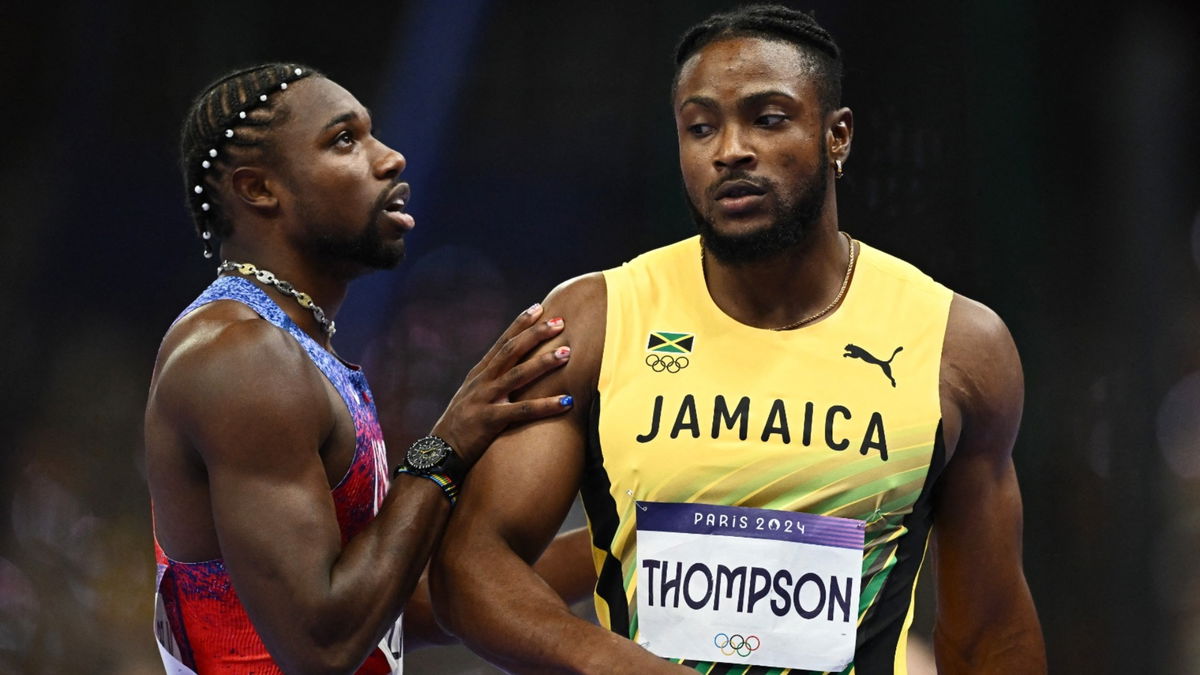
Imago

Imago
In a 100-meter final so closely contested that even the athletes themselves could not be certain of the outcome, Noah Lyles stole Olympic gold in Paris with a lean at the line that rewrote the result. For much of the race, Kishane Thompson had appeared destined for the top step of the podium. He had managed the field from the 30-meter mark and held the lead into the final ten. However, in less than a few seconds, the scenario changed.
Watch What’s Trending Now!
In a flash of movement, barely perceptible in real time, Lyles threw his torso forward, catching the camera and the gold medal in one motion. The difference between first and second? A mere 0.03 seconds. The move that crowned a champion left Thompson with silver and a sharp perspective on the moment that cost him victory. However, recently Thompson has secured an impeccable win at the Jamaican national athletics trials. And grabbing the victory, Kishane reflected on the stance that probably cost him the Olympic gold.
ADVERTISEMENT
Kishane Thompson in the post race presser was asked if he has been concentrating on dipping. The Jamaican phenom bluntly stated, “It doesn’t take much to learn how to dip, honestly.” He added, “Dipping is not really the key part of a race, honestly. If a person is good as they are, from 0 to 100 meters, if you set yourself apart from the competition, you don’t need to dip. I’m just saying that.” Thompson was calm but pointed, speaking as someone who had owned 90 meters of the Olympic final and still walked away with less than he had aimed for. “Imagine going from 0 to 95 meters or 90 meters about, and you’re at the back of the field. Dipping is not going to save you the win. You get what I’m saying?”
For Lyles, it had in fact done precisely that. The American had tied for the slowest reaction time in the field, lagged in last place through the first 40 meters, and was only seventh at the halfway mark. It was only at the 60-meter point, when he registered a top speed of 43.6 kilometers per hour, that he entered medal contention. His final 10 meters, covered in 0.86 seconds were faster than Thompson’s, and his lean at the finish line, whether practiced or instinctive, proved decisive. It was the kind of finish that can define an Olympic narrative, even when the race itself almost escaped him.
ADVERTISEMENT
Full clip of Kishane Thompson 🇯🇲 talking about dipping at the finish.
🎥 @JamaicaObserver pic.twitter.com/WQ1fCmZdHY
— Track & Field Gazette (@TrackGazette) June 28, 2025
Thompson, who had run 9.77 earlier in the season, the fastest time in the world this year, remained philosophical. “I wasn’t patient enough with myself to let my speed bring me at the line, in the position that I know I could have gone to,” he has previously admitted. Still, his tone suggested less regret and more a reiteration of principle. In his view, the body of the race, not its final gesture, should dictate the outcome. “The majority and the best part of the race is the dry phase, the transition, and your maintenance,” he said, maintaining that a truly dominant performance renders the dip unnecessary.
ADVERTISEMENT
Even so, in Paris, dominance over 90 meters proved insufficient. The difference between gold and silver came down to what happened in the final step. While Thompson’s philosophy of sprinting remains uncompromised, the scoreboard in the Stade de France told a different story. And on this occasion, it rewarded the one who dipped. However, a year has passed since then. And as it appears the Jamaican star too is gearing up yet again.
ADVERTISEMENT
Kishane Thompson storms to 9.75 and rewrites sprinting history in Kingston
In an arena accustomed to speed, Kishane Thompson produced a performance that altered the shape of history’s most exclusive sprinting ledger. With a wind-legal time of 9.75 seconds in the men’s 100 metres final at the Jamaican national championships, the 23-year-old carved his name into the sixth slot on the all-time list, surpassing legends whose times once seemed immovable. It was not merely a title defence. It was a recalibration of the modern sprinting standard.
Thompson’s mark, delivered with the composure of a man unshaken by proximity to greatness, is now the fastest 100 metres time recorded in nearly a decade. Not since Justin Gatlin’s 9.75s in 2015 has the event produced a faster clocking. And while the broader field in Kingston was formidable, Oblique Seville finishing in 9.83s and Ackeem Blake registering a personal best of 9.88s, it was Thompson’s movement through the phases, his precision off the drive and relentless top-end control, that lent the performance its lasting impression. The time sliced two-hundredths from his previous personal best, set only weeks prior, and marked the quickest showing at a national championships since Yohan Blake’s 9.75s in 2012.
ADVERTISEMENT
It was also Thompson’s second consecutive national title, a feat no Jamaican man had achieved since Blake in 2017. “It feels great to come out here and run a personal best,” Thompson remarked after the final. “It’s always great competing at home.” Though brief, the statement carried the weight of a man well aware that his run in Kingston was not merely domestic excellence. It was a line crossed into historical consequence.
ADVERTISEMENT
ADVERTISEMENT
ADVERTISEMENT